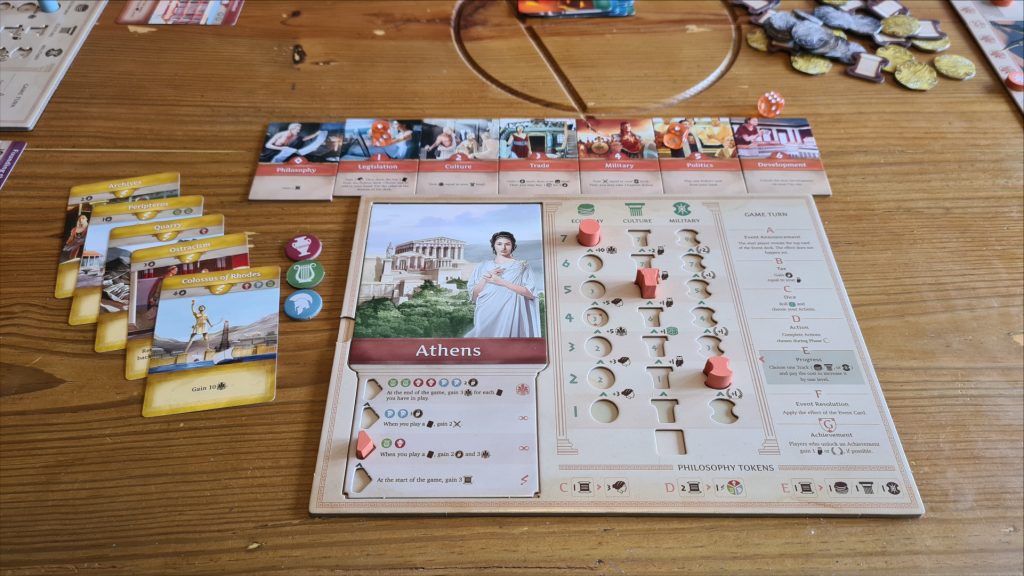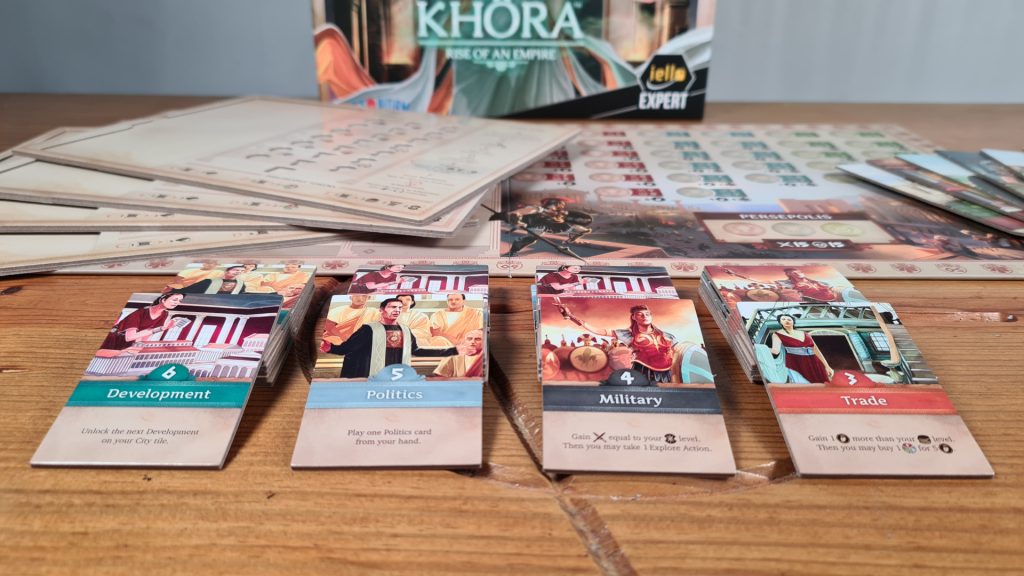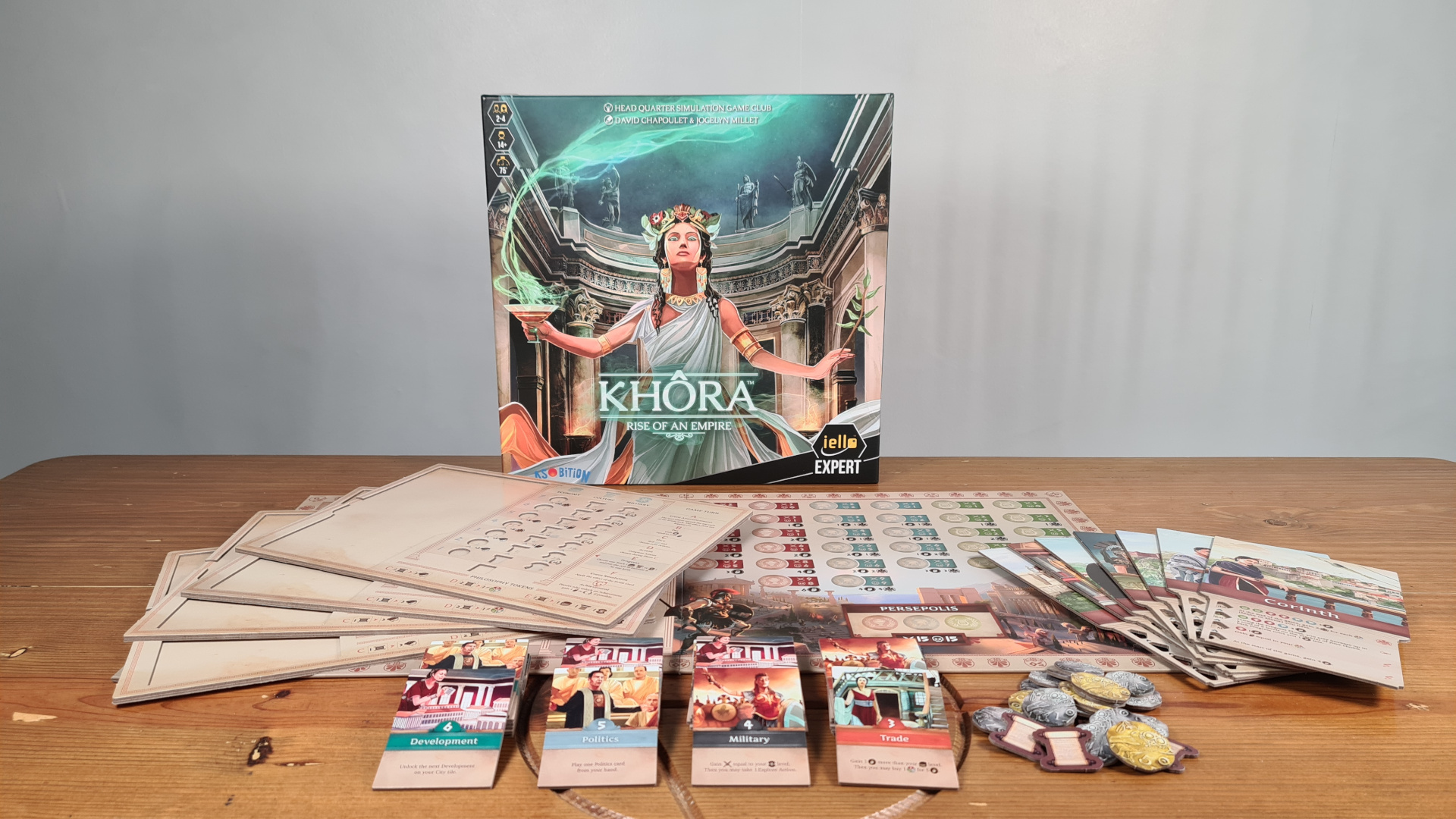Khôra Rise of an Empire is the brand new strategy game from IELLO, which reimplements the 2017 title Improvement of the POLIS. From Head Quarter Simulation Game Club, featuring artwork from David Chapoulet and Jocelyn ‘Joc’ Millet, the game sees 2 – 4 players developing cities in Ancient Greece. In just over an hour players will use dice and cards to tax, dabble in politics and revel in the glory of matching troops to explore. However, is Khôra one for the history books? Let’s find out!
Khôra is played across nine rounds, each following the same 7 steps. The majority of each round can be simultaneously performed by players, though a few actions follow a player order. Players will be pushing up Economy, Culture, Military and Development trackers on their personal board, with Citizens, Tax, Glory, Troops and victory points tracked on a central board. While points are the main goal, players will need to push up at least some of the other tracks to be able to score big.
At the beginning of each round an event is revealed. Every game starts and ends with the same two predetermined events, with the remaining 7 randomly selected. The majority of these events only occur at the very end of the round, giving players a chance to prepare for them. Tax is then earnt, though for the first round or two chances are no one will have moved up the tax track. Then it’s time to roll dice, with each player starting with two action dice – with a third unlockable.
For the action step players secretly assign their dice. Each player has 7 action tiles, numbered 0 – 6. Any of the actions can be taken once per round. Yet, if the die used to activate an action tile is of lower value than the tile citizens, equal to the difference, are spent by the player. The first action Philosophy (0) sees the player gain 1 philosophy token, which can be useful for the politics and development actions. Legislation (1) sees the player gain citizens to spend later and a choice of two cards from the deck. Culture (2) simply scores the player victory points based on their current culture level.

Trade (3) sees money earnt at a rate of 1 + your current economy level, with the option to purchase a lesser knowledge token – which are normally acquired through Military (4). Military sees a player gain troops equal to their military strength and then based on their troop level explore for a knowledge token. These can come with coins, troop losses and points, and are needed for many politics and development actions. Split into two types the harder knowledge tokens with laurels don’t get replaced and are involved with final scoring.
Politics (5) is how players play the cards gained from the Legislation action (or from their started drafted hand of five cards). These can have a coin cost and some require the player to have specific coloured knowledge tokens. From instantly gaining victory points or increasing tax income to scoring points at the end of the game for citizens – these have a variety of abilities to work into any strategy. Lastly Development (6) sees the player step up on their development tracker. Like politics cards these have costs and requirements, and also offer unique instant or ongoing powers to players.
After all actions have been taken the progress step triggers. This sees all players able to spend coins to advance one space on the economy, culture or military track. Before the round ends the event is finally resolved. Events may see all players moving up or down indicated trackers, or revolve around who is highest / lowest on the troop track. If anyone can score an achievement, for example for reaching 4 on the economics track, it is then awarded. Play then moves onto the next round. After nine rounds, with a few end game scoring opportunities completed, whoever is on the most points wins!
IELLO isn’t known for longer, more complex games, and to distinguish this for gamers this is indicated on the box with an IELLO Expert logo. The rulebook does a phenomenal job of stepping through each aspect of a turn. There are detailed explanations of every possible benefit and plenty of examples with images throughout.
Importantly, the actions and rewards on offer to players in Khôra aren’t hard to comprehend. Each individual part is easy to understand, but build up together to create interesting choices. Advancing on a tracker might get you the citizens needed to take another action that turn. To use development or politics chances are you will have needed to gain knowledge tokens ahead of time. A lot of the elements are at least somewhat interwoven, almost comboing together or needing to be done in an order. Players are never stuck wondering what they can do though. Instead, left by the game to determine what is most beneficial to do.

Without the ability to manipulate the dice rolled with citizens, luck would have driven the outcome of the game. While it is still a luck factor, having the choice of when to spend citizens to adjust dice and when to just deal with a bad roll can be an interesting one. Making the luck factor less impactful again is the fact players aren’t always wanting high numbers. More opportunities to manipulate the dice would reduce the luck further, though it would also have introduced more analysis paralysis potential. It gives players enough to work around without feeling of never being able to do what you want, whilst not bogging the players down too much with endless choices.
If there’s one aspect of some modern board games that I wish was more widely used, for the more premium feel and not needing to worry about knocking boards, it is a dual layer design. All of the player boards in Khôra are dual layered, not only having spaces for matching shaped tokens but also an entire large city tile. Ignoring the fact that this could allow for expansion cities to easily be added it means that seven cities can be included rather than just 4 unique ones for the 4 player boards.
The player boards include reminders of the round phases and even philosophy token usages. While after a couple of games these become easy to remember, including these bits of information make a learning game and the first couple of playthroughs that bit smoother. It also means there are less glances into the rulebook. The only part missing in this regard is information or quick reminders for scoring. There are a few ways to score points at the end of the game which could be forgotten. This is of course all calculated at the end of the game though, so there is little to no interruption caused by checking the rulebook at this point, compared to midway through a turn.
Putting the nerdy enjoyment of dual layered player boards aside, there is very little to catch the eye. There is the odd splash of colour in terms of the city artwork and a handful of knowledge and player tokens. Otherwise, Khôra is a rather bland looking game with a lot of trackers – in other words it looks very much like a “euro” game. Going into the experience I was concerned by the amount of luck from the dice but citizens are almost thrown at players to mitigate luck from the game. Khôra Rise of an Empire is crammed full of meaningful decisions: allowing players to score in a variety of ways, feel satisfaction from correct choices and regret for others. It takes a game for the importance of things to be realised and when it clicks you’ll realise you want to play again and again!
(Editor’s Note: Khôra Rise of an Empire was provided to us by Coiledspring Games for the review. It is currently available from local board game stores! Find your local store here.)

